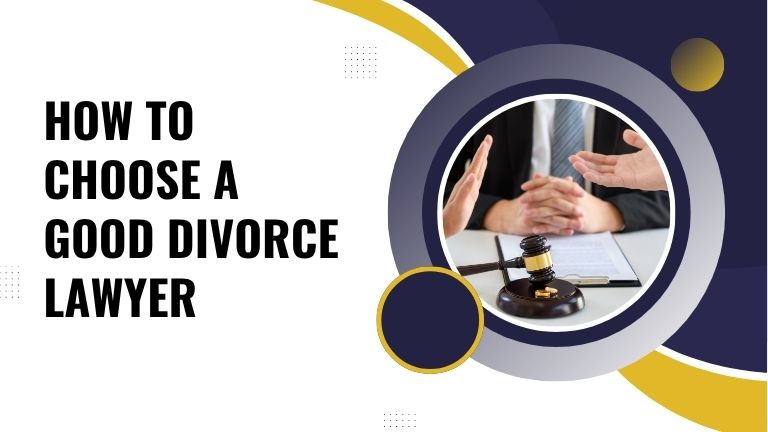Divorce is one of life’s most emotionally and legally challenging experiences. Whether it’s a mutual separation or a contentious split, having the right legal support can make all the difference. Choosing a good divorce lawyer is not just about finding someone with a law degree — it’s about finding a professional who understands your situation, represents your interests, and helps you navigate the legal complexities with compassion and confidence.
In this article, we’ll walk you through practical and essential tips on how to choose a good divorce lawyer who suits your needs.
Understand What You Need from a Divorce Lawyer
Before you start your search, take a moment to assess what kind of legal support you need. Divorce cases can vary widely, from simple uncontested divorces to complex disputes involving child custody, property division, and alimony.
Ask yourself:
- Is the divorce amicable or contentious?
- Do we have children or shared property?
- Is there a risk of domestic abuse or manipulation?
Your answers will determine whether you need a tough litigator, a skilled negotiator, or a family law mediator. A good divorce lawyer will have strengths aligned with your specific needs.
#1- Look for Specialization in Family Law
Always choose a lawyer who specializes in family law or, more specifically, divorce law. General practitioners may lack the in-depth experience and updated knowledge needed to handle complex divorce matters effectively.
Family law specialists will:
- Know the intricacies of local divorce laws
- Be familiar with judges and court procedures
- Have handled similar cases successfully
You can verify their specialization through their website, online profiles, or by asking during an initial consultation.
#2- Check Reviews and Referrals
Word of mouth is powerful. Ask friends, family, or colleagues if they can recommend a good divorce lawyer. Personal referrals are valuable because they come from people who have already experienced the lawyer’s services firsthand.
Additionally, look up:
- Online reviews on Google or legal platforms like Avvo, Justia, or LawRato
- Client testimonials on the lawyer’s website
- Ratings by legal directories
Watch for consistent praise regarding professionalism, responsiveness, and successful case outcomes.
#3- Evaluate Communication and Compatibility
Your lawyer will be your legal partner throughout an emotionally charged process. That’s why it’s crucial to choose someone who listens to you, explains things clearly, and respects your goals.
During the initial consultation, consider:
- Do they answer your questions thoroughly?
- Are they patient and empathetic?
- Do you feel comfortable discussing personal issues?
Avoid lawyers who are dismissive, overly aggressive, or rush through conversations. A good divorce lawyer should be a trusted advisor, not an intimidating figure.
#4- Discuss Strategy and Approach
Not all lawyers approach divorce the same way. Some are aggressive litigators who aim for courtroom victories. Others prefer collaborative divorce or mediation, which promotes negotiation and compromise.
Ask the lawyer:
- What’s your strategy for a case like mine?
- Do you encourage settlement or usually go to trial?
- What’s your success rate in similar cases?
A lawyer’s approach should align with your preferences. For example, if you want a peaceful divorce, a lawyer who thrives on courtroom battles may not be the right fit.
#5- Understand Legal Fees and Billing Structure
Divorce can be expensive, and legal fees vary widely. Be upfront about your budget and ask the lawyer to clearly explain their fee structure.
Common billing types include:
- Hourly Rate: You pay for the time spent on your case (common in contested divorces).
- Flat Fee: A fixed amount for handling the entire divorce (suitable for uncontested divorces).
- Retainer Fee: An upfront deposit that covers initial work and expenses.
Ask about:
- What services are included in the fee?
- Are there any extra charges (e.g., court filing fees, travel)?
- How frequently will I be billed?
Transparency in billing is a strong sign of professionalism.
#6- Check for Availability and Responsiveness
Divorce cases often involve time-sensitive matters. Your lawyer should be available when needed and quick to respond to calls or emails.
Before hiring, ask:
- How often will we communicate?
- How soon do you typically respond to emails or calls?
- Will I be working directly with you or your team?
A good divorce lawyer should not make you feel like just another case file.
#7- Trust Your Instincts
Ultimately, your comfort level with the lawyer matters. Trust your gut feeling during the consultation. If something feels off — even if they’re highly rated — it’s okay to walk away and continue your search.
Look for a lawyer who:
- Makes you feel heard
- Explains legal jargon in simple terms
- Is ethical and honest
- Demonstrates genuine interest in your well-being
Your instincts, combined with research, are often the best guide.
#9- Schedule Multiple Consultations
Don’t settle on the first lawyer you meet. Schedule consultations with at least 2–3 different lawyers before making your final decision. Comparing different professionals will give you a clearer understanding of what to expect and help you identify the best match.
Some lawyers offer free initial consultations, while others may charge a nominal fee. It’s a worthwhile investment to ensure you choose the right advocate.
Conclusion
Choosing a good divorce lawyer isn’t just a legal decision — it’s a personal one. The right lawyer will not only protect your legal rights but also help you navigate one of the most difficult chapters of your life with dignity and clarity.
Take your time to research, ask the right questions, and listen to your instincts. A good divorce lawyer can be the difference between a stressful legal battle and a smoother path to a new beginning.
NOTE- If you need to hire lawyer contact us a leading Expert Divorce Lawyer in Gurgaon
ALSO READ
How to Implement ISO 27001 in an Organization
Trademark Registration for Amazon Sellers India

